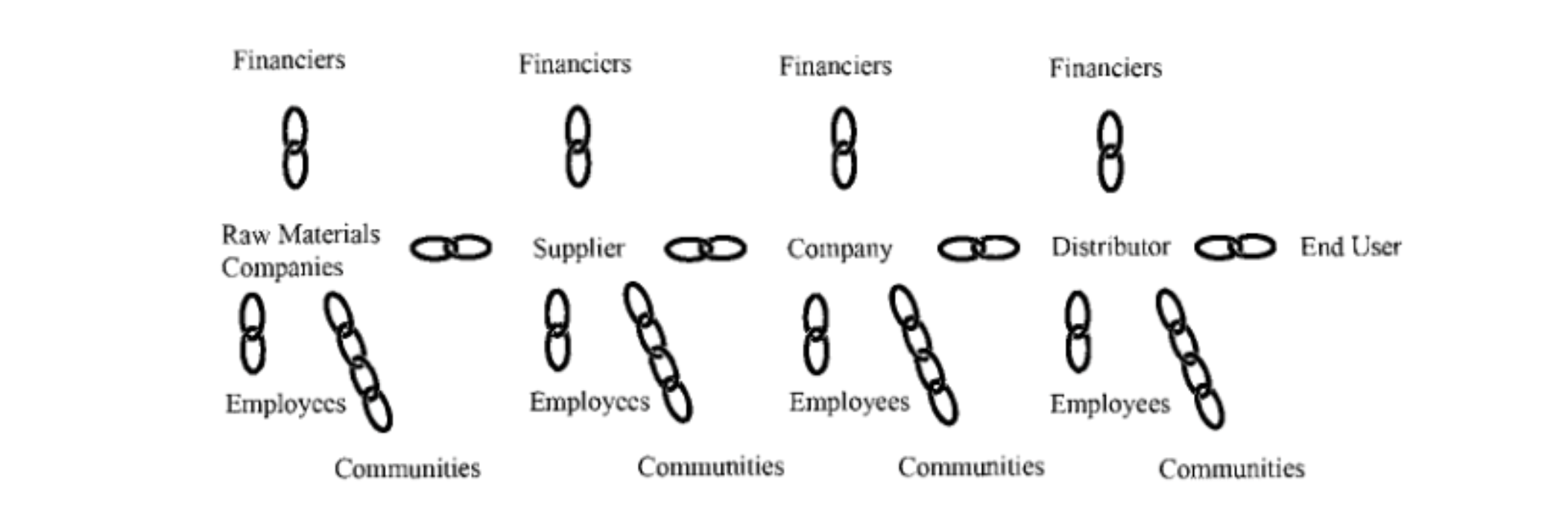Module 3 131
1/25
There's no tags or description
Looks like no tags are added yet.
Name | Mastery | Learn | Test | Matching | Spaced |
|---|
No study sessions yet.
26 Terms
Milton Friedman
Shareholder priority
Fiduciary reponsibility
long term interest of stakeholders
Profit maximization
agents must act in the best interest of the shareholders by seeking profit not personal goals/interests (PA Problem)
fiduciary duty
firms owe profit to shareholders
Edward Freeman
Firms require consent from society
Must consider all stakeholders
better for society
Still capitalism
requires social contracts and satisfying consumers
stakeholder capitalism - ppl want to innovate a create not simply bc of competition
Responsibility chain

everyone is responsible for their own actions
business roundtable 2019
commit to deliver value to all of stakeholders
Porter & Kramer
doing well by doing good
win win opportunity
CSV
king and pucker
real trade offs between profits and CSR
can exacerbate income and wealth inequality
ignoring negative externalities
potential to erode ethical standards
potential to undermine interest of other vital stakeholders (e.g., customers,
suppliers, and communities)potential to contribute to systemic risks in the financial system
may undermine democratic processes by concentrating economic power in hands
of few
types of stakeholder capitalism
instrumental stakeholder capitalism
classic stakeholder capitalism
beneficial stakeholder capitalism
structural stakeholder capitalism
role of ESG in stakeholder capitalism
B-Corps and Benefit Corporations
critiques of Stakeholder Capitalism
risk of managerial opportunism
balancing competing interests of various stakeholders
potential for inefficiency and reduced competitiveness
greenwashing or superficial adoption of stakeholder capitalism principles (ESG as
public relations)
potential to undermine shareholder rights
‘win-win’ approaches as overly optimistic claims about combining profit and social &
environmental good
typically overpromise & underdeliver
Negawatt revolution (profits from energy efficiency)
circular economy (cost-
effective recycling and reuse)Base of the Pyramid (profiting while uplifting the poorest
populations)
Perspectives on Business Ethics
Deontology
Utilitarianism
Virtue Ethics
Social Justice Ethics (aka, ‘Social Contract Theory’)
utilitarianism
aligned with free market economics
focuses on results not rules
maximizing happiness and pleasure for society
‘act utilitarianism’
which action will create the most utility
‘rule utilitarianism’
which rule followed regularly will create the greatest good for society
Deontology
Moral intent is the better path to ethical conduct
Immanuel Kant
duties are defined by rational thought
duties are universal and equal before god
any law or action must be universal
consistent- must be good if applied to everyone
reversible- good if you consider the other party
Liberatarianism
individuals have rights which should not be infringed
humans should pursue their own happiness
Social Justice Theory and Social Contract Theory
people want gov and are willing to exchange certain rights for security and common benefits
balancing human desire for freedom and human desire for order
dynamic- allows for change
basic vs non basic rights
positive vs negative rights
positive- right to bote right to bear arms
negative- right to be free of unwanted searches
Aristotle and Virtue Theory
AKA Virtue ethics
values virtuous qualities rather than formal rules
the goal of human existence is the rational search for excellence
Ethical breakdowns
Ethical fading
no longer considering ethics as a part of decision making
motivated blindness
people see what they want to see
solution- root out conflicts of interest
ill-conceived goals
e.g. hour padding
solution- must brainstorm unintended consequences
indirect blindness
outsourcing unethical behavior
solution- must evaluate 3rd parties
slippery slopes
gradual increasing unethical behavior
solution- pay attention to trivial infractions
overvaluing outcomes
valuing outcome more than means
solution reward solid decision processes
bounded ethicality
systematic cognitive barriers that prevent us from being as ethical as we wish to be
system 1 vs system 2 thinking
system 1- intuitive, fast, emotional
system 2- logical, slow
Carter Racing
Deciding whether to race or not- risk of engine faliure
Apple case study
FBI wanted to unlock a terrorist’s iPhone and apple denied request
later increased security even more